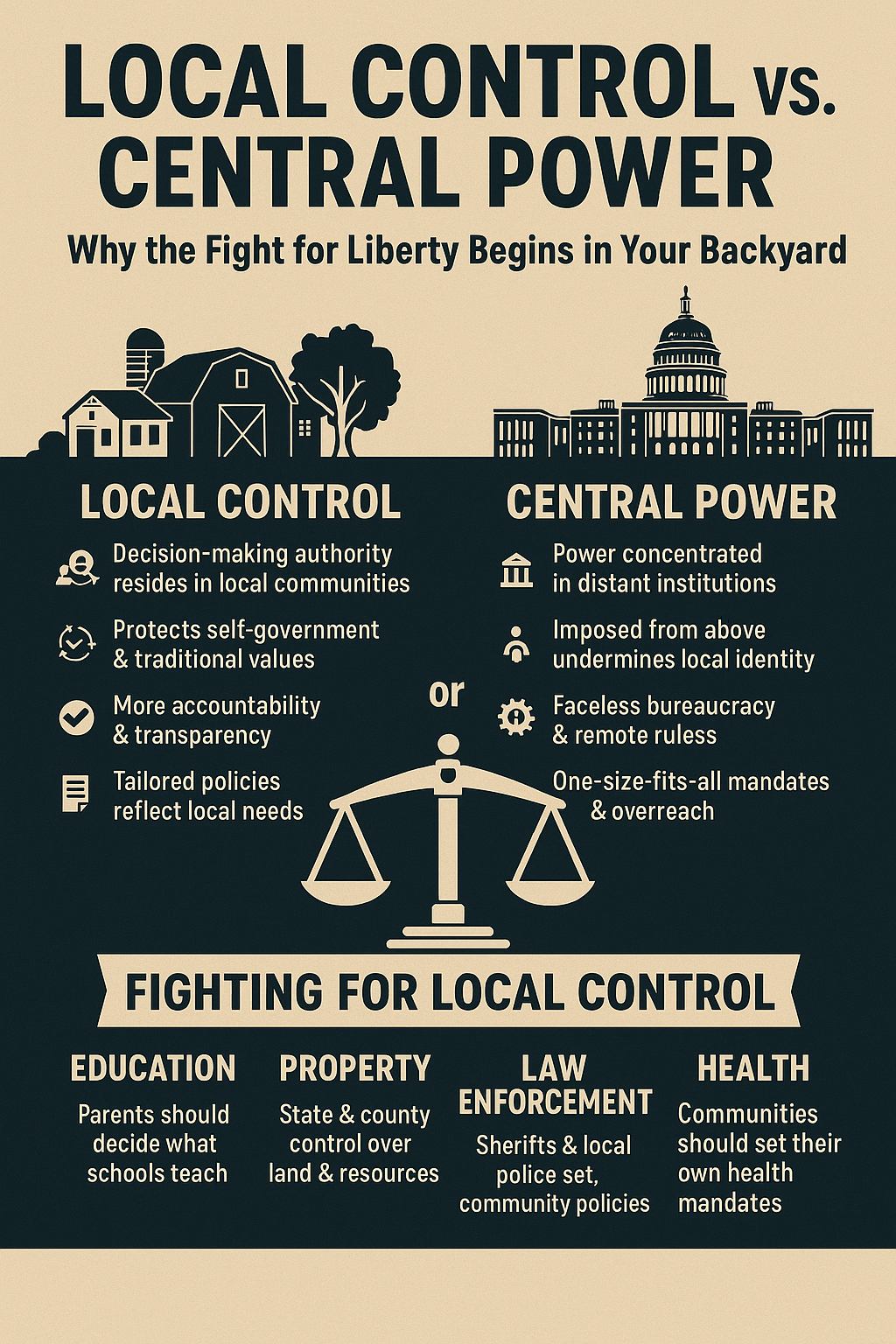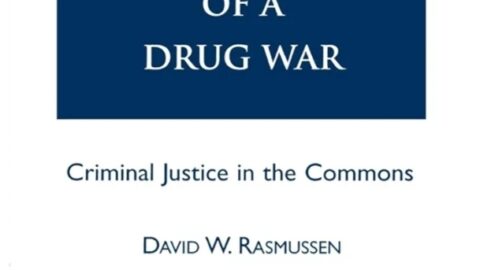I. Introduction: The Core of a Constitutional Republic
To be a local control advocate means to champion the authority of local communities—families, towns, counties, and states—to govern themselves without interference from distant or centralized authorities. In the spirit of the U.S. Constitution and the Founders’ vision, local control reflects the belief that decisions should be made as close as possible to the people they affect.
This is not merely a political preference; it’s a philosophical and moral framework for defending liberty, preserving identity, and ensuring accountability.
II. Defining Local Control
Local control is the principle that:
- Decision-making authority should reside primarily in local or regional bodies rather than at the national or global level.
- Families, school boards, city councils, and state legislatures have the right and responsibility to self-govern according to the values, needs, and consent of their people.
It contrasts with centralized control, where distant bureaucracies or federal agencies dictate policies with little regard for local conditions or cultural distinctions.
III. The Foundations of Local Control
1. Constitutional Design
- The U.S. was built on federalism: power shared between national and state governments.
- The 10th Amendment affirms that powers not delegated to the federal government are reserved to the states or the people.
2. Moral Philosophy
- True justice requires that those closest to the issue make decisions.
- Local control allows for moral responsibility, not anonymous compliance with faceless authority.
3. Civic Tradition
- Local engagement promotes accountability, transparency, and personal involvement in governance.
- It builds trust, while centralized systems breed resentment and detachment.
IV. What Local Control Advocates Believe
1. Parents Should Direct Education
- Local school boards—not federal agencies or unions—should shape curriculum.
- Parents must have rights to opt out of ideologically driven content or health mandates.
2. States and Counties Should Manage Their Lands
- Reject federal overreach into land use, water rights, and energy policy.
- Especially relevant in the West (e.g., Utah), where the federal government controls vast land tracts.
3. Local Law Enforcement > Federal Agencies
- Communities should set their own policies on policing, criminal justice, and gun rights.
- Oppose federal deputization or “nationalized” law enforcement efforts.
4. Cities and Counties Should Protect Health Freedom
- COVID policies exposed how centralized mandates (lockdowns, school closures) ignored local science, economics, and community well-being.
5. Local Economies > Globalism
- Support community-driven agriculture, manufacturing, and trade over global supply chains or technocratic control (e.g., ESG scores, CBDCs).
V. Real-World Threats to Local Control
1. Federal Overreach
- Mandates on education (Common Core), environment (EPA), and healthcare (HHS).
- “Strings attached” funding that coerces local entities to conform to federal agendas.
2. Judicial Activism
- Courts striking down laws passed by local or state governments that reflect local values (e.g., abortion restrictions, religious freedom ordinances).
3. Technocratic Governance
- Algorithms, surveillance, and digital ID systems administered far from local accountability.
4. Corporate-Political Collusion
- Big Tech and multinational corporations partnering with federal agencies to influence local elections, speech, or zoning policies.
VI. The Blessings of Local Control
1. Freedom to Preserve Community Values
- A Christian town can protect its moral foundations.
- An agricultural county can prioritize land stewardship over green mandates.
2. Innovation and Flexibility
- Different regions can experiment with tailored policies—what works in rural Utah might not work in San Francisco.
3. Greater Accountability
- You can confront your school board or sheriff—but not a federal bureaucrat in D.C.
4. Civic Engagement
- Local control cultivates citizens, not just subjects.
VII. The Cost of Losing Local Control
Individual
- Feels powerless, monitored, and dependent on centralized systems.
- Trained to obey, not discern.
Family
- Parental rights eroded in favor of state-sanctioned ideology.
- Curriculum, healthcare, and even gender decisions are taken out of the home.
Generations
- Children inherit a system of top-down control.
- Lose memory of self-governance and responsibility.
Society
- Division and distrust increase.
- Local cultures dissolve under national mandates.
Nation
- America becomes a technocracy or soft tyranny—governed by bureaucrats, not by consent.
- Constitutional federalism becomes obsolete.
VIII. The Call to Action
- Defend your school board, city council, sheriff, and state rights.
- Demand accountable representation, not federal imposition.
- Learn your state constitution and local ordinances.
- Support candidates who pledge to uphold local sovereignty and resist globalism.
“The government closest to the people serves the people best.” — Thomas Jefferson (attributed)
Conclusion: Liberty Begins at Home
To be a local control advocate is to believe that freedom is not built by distant rulers—but by neighbors who care, communities who govern, and families who lead. It is not anti-government. It is self-government, by the people, for the people, and near the people.






